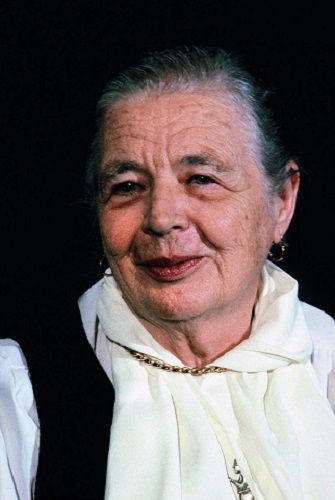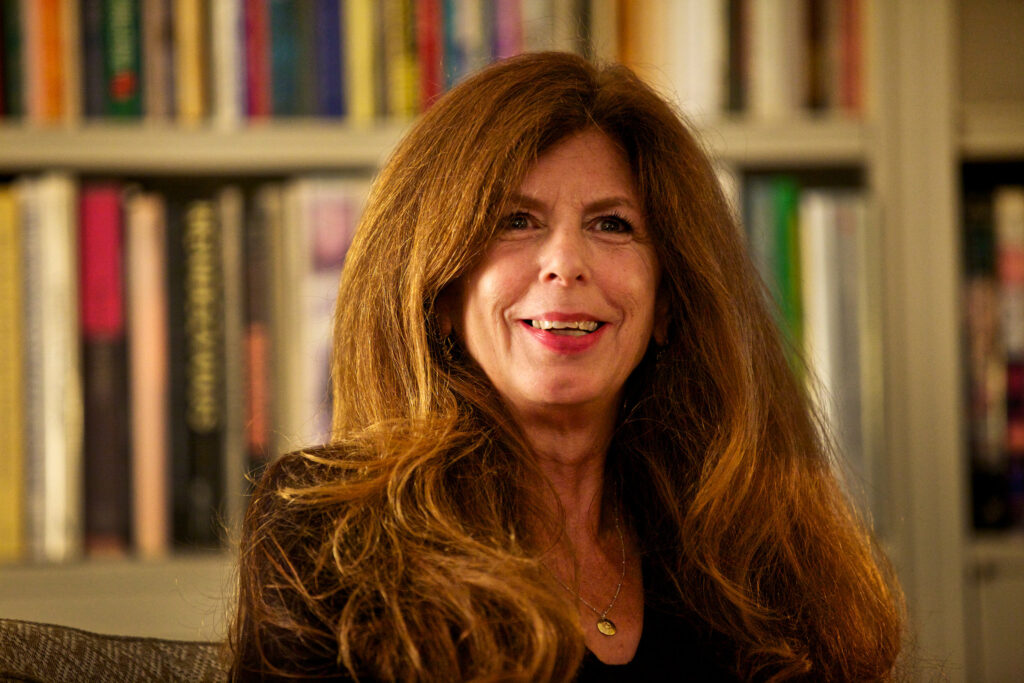De Belgisch-Amerikaanse, Franstalige schrijfster Marguerite Yourcenar werd geboren in Brussel op 8 juni 1903. Zie ook alle tags voor Marguerite Yourcenar op dit blog.
Uit: Memoirs of Hadrian (Vertaald door Grace Frick, in samenwerking met de schrijfster)
“The methods of grammarians and rhetoricians are perhaps less absurd than I thought them to be during the years when I was subjected to them. Grammar, with its mixture of logical rule and arbitrary usage, proposes to a young mind a foretaste of what will be offered to him later on by law and ethics, those sciences of human conduct, and by all the systems wherein man has codified his instinctive experience. As for the rhetorical exercises in which we were successively Xerxes and Themistocles, Octavius and Mark Antony, they intoxicated me; I felt like Proteus. They taught me to enter into the thought of each man in turn, and to understand that each makes his own decisions, and lives and dies according to his own laws. The reading of the poets had still more overpowering effects; I am not sure that the discovery of love is necessarily more exquisite than the discovery of poetry. Poetry transformed me: initiation into death itself will not carry me farther along into another world than does a dusk of Virgil. In later years I came to prefer the roughness of Ennius, so close to the sacred origins of our race, or Lucretius’ bitter wisdom; or to Homer’s noble ease the homely parsimony of Hesiod. The most complicated and most obscure poets have pleased me above all; they force my thought to strenuous exercise; I have sought, too, the latest and the oldest, those who open wholly new paths, or help me to find lost trails. But in those days I liked chiefly in the art of verse whatever appealed most directly to the senses, whether the polished metal of Horace, or Ovid’s soft texture, like flesh. Scaurus cast me into despair in assuring me that I should never be more than a mediocre poet; that both the gift and the application were wanting. For a long time I thought he was mistaken; somewhere locked away are a volume or two of my love poems, most of them imitated from Catullus. But it is of little concern to me now whether my personal productions are worthless or not.
To my dying day I shall be grateful to Scaurus for having set me early to the study of Greek. I was still a child when for the first time I tried to trace on my tablets those characters of an unknown alphabet: here was a new world and the beginning of my great travels, and also the feeling of a choice as deliberate, but at the same time as involuntary, as that of love. I have loved the language for its flexibility, like that of a supple, perfect body, and for the richness of its vocabulary, in which every word bespeaks direct and varied contact with reality: and because almost everything that men have said best has been said in Greek. There are, I know, other languages, but they are petrified, or have yet to be born. Egyptian priests have shown me their antique symbols; they are signs rather than words, ancient attempts at classification of the world and of things, the sepulchral speech of a dead race. During the Jewish War the rabbi Joshua translated literally for me some texts from Hebrew, that language of sectarians so obsessed by their god that they have neglected the human.”

De Georgische schrijfster en regisseuse Nino Haratischwili werd geboren op 8 juni 1983 in Tbilisi. Zie ook alle tags voor Nino Haratischwili op dit blog.
Uit: Het achtste leven (Vertaald door Elly Schippers en Jantsje Post)
“Nadat Aman in slaap was gevallen stond ik op, liep naar de badkamer, ging op de rand van het bad zitten en begon te huilen. Met de tranen van een hele eeuw huilde ik om die geveinsde liefde, om het verlangen naar geloof in de woorden die mijn leven ooit zo sterk hadden gevormd. Ik ging naar de keuken, rookte een sigaret en staarde uit het raam. Het was opgehouden met regenen en om de een of andere reden wist ik dat er iets gebeurde, dat er iets in gang was gezet, iets buiten dit huis met de hoge plafonds en de eenzame boeken. Met de vele lampen die ik naarstig had verzameld als vervanging voor de hemel, als een illusie van het ware licht De verlichting van mijn eigen tunnel. Maar de tunnel was gebleven, de lichten hadden me maar even, maar kortstondig kunnen troosten. Misschien moet ik nog vertellen dat Brilka een heel lang meisje was, bijna twee koppen groter dan ik, wat met mijn lengte niet zo moeilijk is, dat ze stekeltjeshaar had en een John Tennon-brilletje droeg, gekleed ging in een afgeknipte spijkerbroek en een houthakkershemd, volmaakt ronde cacaoboonogen had die altijd naar sterren zochten, en een oneindig hoog voorhoofd – waarachter veel verdriet schuilging. Ze was net weggelopen bij haar dansgroep die in Amsterdam een gastoptreden gaf, ze danste de mannenrollen, want voor de folkloristische, lieflijke vrouwen-dansen uit ons vaderland was ze een treetje te apart, te lang en te somber. Na lang soebatten had ze eindelijk toestemming gekregen om verkleed als man op te treden en met wilde gebaren te dansen; haar lange vlecht was als gevolg van die toestemming het afgelopen jaar gesneuveld. Ze mocht kniesprongen en degengevechten uitvoeren, die haar altijd al beter waren afgegaan dan de golvende, dromerige bewegingen van de vrouwen. Dansen was haar lust en haar leven en nadat ze haar voor het Nederlandse publiek ook een solopartij hadden gegeven omdat ze zo goed was, zoveel beter dan de jongemannen die in het begin om haar hadden geglimlacht, verliet ze het gezelschap, op weg naar haar antwoorden die ook het dansen haar niet kon geven.
De volgende avond werd ik gebeld door mijn moeder, die telkens dreigde dat ze zou sterven als ik niet gauw terugkwam naar mijn vaderland, waaruit ik jaren geleden was weggevlucht Ze deelde me met trillende stem mee dat ‘het kind’ was verdwenen. Het duurde even voor Ik begreep welk kind ze bedoelde en wat dat allemaal met mij te maken had. ‘Nog een keer, waar zat ze precies?’ ‘In Amsterdam, wat heb je toch, verdorie? Luister je eigenlijk wel? Ze is er gisteren vandoor gegaan en heeft een berichtje achtergelaten. Ik ben gebeld door de groepsleidster.”

Onafhankelijk van geboortedata
De Amerikaanse dichteres Marie Howe werd geboren in 1950 in Rochester, New York. Zie ook alle tags voor Marie Howe op dit blog.
Veertien
Ze is nog steeds van mij – voor nog ongeveer een jaar,
maar ze kijkt al langs me heen
door de deur van het uitvaartcentrum
naar waar de jongens zich hebben verzameld in hun zwarte pakken.
Vertaald door Ellen Deckwitz

Zie voor nog meer schrijvers van de 8e juni ook mijn blog van 8 juni 2020 en eveneens mijn blog van 8 juni 2019 en ook mijn blog van 8 juni 2018 en eveneens mijn blog van 8 juni 2017.
